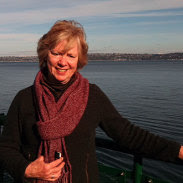The session is an overview of Web 2.0 "transformative" tools: blogs, wikis, RSS feeds, andsocial bookmarking. These technologies have introduced "hugely disruptive times in education." Learning the tool is only a piece of it. The key is learning how to create our own personal learning environments. Our students need to know how to do this, given the Dept. of Ed's prediction that the future holds many job changes.
 We're starting with WikiSpaces.com to take a first-hand look at this collaborative tool. Whereas blogs are about conversation, wikis are about collections (e.g., building a media textbook as a classroom project). Oops...tech problems here at the Georgia World Congress Center. Wikispaces has slowed to a crawl. We're moving onto to RSS.
We're starting with WikiSpaces.com to take a first-hand look at this collaborative tool. Whereas blogs are about conversation, wikis are about collections (e.g., building a media textbook as a classroom project). Oops...tech problems here at the Georgia World Congress Center. Wikispaces has slowed to a crawl. We're moving onto to RSS.RSS feeds bring blogging updates to the reader. We're looking at Google Reader right now. Blog readers can almost become a "daily curriculum." (I've been using Bloglines, but I like the interface of Google Reader, but don't like the fact that when you insert a blog topic, the list that appears on the right-hand column gives only sites' RSS URL, not the actual blog URL. So that's a few more steps to decide whether to subscribe or not.)
Will is making a strong case for the need to learn organizational "folksonomies" where we decide the organizational setup. If there is a website you like, but don't know if there's a RSS feed, just input the URL to the Add Subscription window. Or as a Google search, put topic +RSS to find the feed. You can also narrow your searches by using Google News or use the advanced search in Google to limit to a single source such as CNN - great for tracking just one news topic, e.g., Darfur. Right click on RSS feed icon to bring up the unique address of a feed. What's key is giving our students tools for finding disparate sources from disparate geographies and multiple views. If it's opinion you're looking for, go with Google's Blogsearch. "Shared items" feature is handy if you have many following your writing. Hint: TinyURL.com is great source for shortening addresses. Book read recommendation: Everything Is Miscellaneous by David Weinberger.
The biggie for organizing blogosphere "stuff" is using tags. Moving on to delicious.com, bookmarking for the blogosphere. The tagging feature is important for being able to find a site again. It's also important to think about what others would be looking for. There's also the opportunity to save a tag in a unique way, e.g., engPer1. To have Will Richardson, for example, researching sites about blogging, for instance, just go to Will's delicious account and add /blogging - http://del.icio.us/willrich/blogging. Copy the URL and subscribe to Will's research threads. Besides subscribing to other bloggers' delicious accounts, you can also forward sites to colleagues' accounts. You can use the same steps to get specific RSS feeds on YouTube and Flickr.
Will is also using Pageflakes, which I started exploring in Dave Warlick's Sunday session. Big difference between Pageflakes and Google Reader or Bloglines is that it can be shared. Lends itself nicely to an online portfolio (hope it's not blocked in school districts). Pageflakes is more transparent since it can be shared out to the public, or to selected groups. "The world is made of small pieces loosely joined."
WikiSpaces is up and running again, so we're heading back in. Note: login for the educator's commercial-free wiki is at bottom of login screen. The neat thing about WikiSpaces is that you can also upload files, and even embed video files! For cool class projects with wikis, check out Vicki Davis's project connecting a Georgia classroom to a classroom in Bengladesh = Flat Classrooms Project.
We're heading into Learnerblogs - because Edublogs is still down due to server upgrade. And we all agree - James Farmer is a hero for offering this robust, FREE tool for educators.





